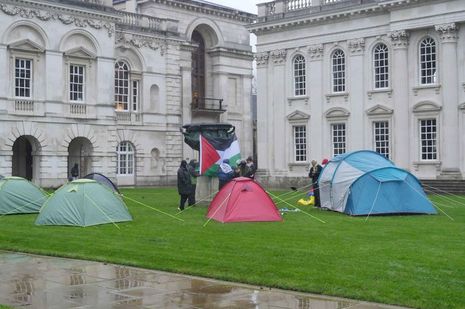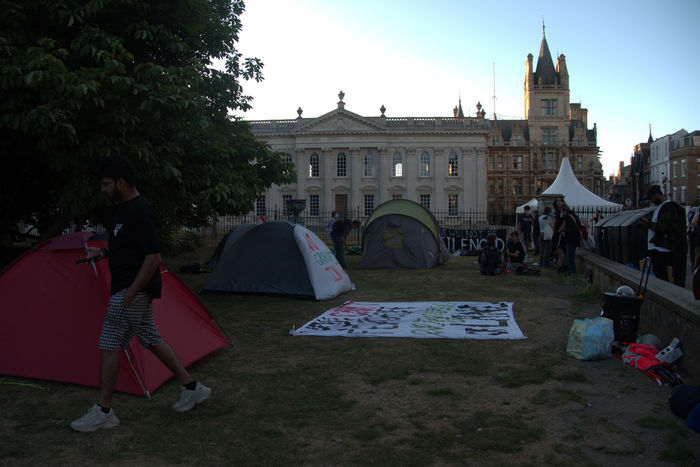Uni secures 12-month injunction against protests
The SU condemned the move, claiming that the ‘University now has a responsibility to act accordingly’

The University of Cambridge has secured a 12-month extension to its legal injunction restricting protests on some of its sites, following a ruling by the High Court on Wednesday (23/07) July.
The decision, made by Mr Justice Butcher, renews an earlier four-month injunction due to expire on 26 July.
The updated order prohibits protesters from entering or occupying several University-owned sites, including Senate House Yard, the Old Schools, and Greenwich House.
For the first time, it also covers Chestnut Tree Lawn, adjacent to Senate House, which was occupied by demonstrators in June.
The University said the measure was necessary to safeguard staff and ensure graduation ceremonies proceed without disruption, citing incidents including the evacuation of an event after a student accused the institution of “complicity” in “genocide in Gaza”.
In a statement, the Cambridge Students’ Union sabbatical officers condemned the decision: “We condemn the University’s decision to take legal action against student protest […] Freedom of speech does not exist if it must be authorised by the very institution it questions.”
“Students have a right to protest. This institution has taught them to have conviction to hold any and all institutions to account in their wrongdoings. The University now has a responsibility to act accordingly. We will continue to urge the University to withdraw its application for injunctive relief,” they continued.
Protest group Cambridge for Palestine (C4P), the subject of the injunction, criticised the ruling on social media, saying: “While thousands more Palestinians are starving to death, for another 12 months you can go to prison for tying a Palestinian flag to the walls of these buildings.”
They added: “Instead of divesting from the genocide they spend billions to fund [it], the University are determined to continue their repression of pro-Palestine student activists.”
The University argued in court that the encampments posed a safety risk, particularly during graduations, as tents might block escape routes.
Kester Lees KC, representing the University, said: “At no stage have the defendants or Cambridge for Palestine disavowed an intention to carry out further direct action […] their social media accounts convey the message that they will continue to carry out direct action until their demands are met.”
Grant Kynaston, representing the European Legal Support Centre (ELSC), argued that the injunction was “overbroad and ambiguous” and raised “serious human rights concerns”.
He said it was “clearly aimed at preventing campaigning and protesting regarding Palestine in particular” and that the measure came at “precisely the time when protests […] are most urgent”.
This action comes weeks after the Office for Students (OfS) warned Universities against “sweeping” bans of protest on University campuses.
The guidance, which comes into effect on August 1, provides advice on how to deal with occupations of graduation sites.
While it recognises that temporary injunctions may be necessary on some pieces of land to ensure that events such as graduations can take place, it explicitly warns against 12-month bans on protests, claiming that they run the risk of meaningfully restricting protest.
The University has continually refuted the allegation that their use of injunctions restricts protest, labelling the claim “ridiculous”.
The legal restrictions on protesting on these sites were originally granted in March, following multiple occupations by pro-Palestine activists in the previous year.
In the last few months, encampments in Trinity College, St John’s College, and Magdalene Colleges have also been prohibited by various High Court injunctions.
A University spokesperson said that “the University is fully committed to supporting the right to protest and to freedom of speech within the law,” adding that claims of restricting protest are “ridiculous”.
They continued: “Protests take place regularly in Cambridge, as is reflected in the judge’s decision which stated that ‘protesters and the campaign are left with ample opportunities and ability to protest their cause in Cambridge’.
“The judge made clear that the injunction ‘does provide a fair balance between the rights of all parties,’” they added, before citing the “physical expansion” as a “health and safety requirement which includes a main fire exit for Senate House Yard”.
 News / Colleges charge different rents for the same Castle Street accommodation2 March 2026
News / Colleges charge different rents for the same Castle Street accommodation2 March 2026 News / King’s hosts open iftar for Ramadan3 March 2026
News / King’s hosts open iftar for Ramadan3 March 2026 Theatre / Lunatics and leisure centres 4 March 2026
Theatre / Lunatics and leisure centres 4 March 2026 News / Angela Merkel among Cambridge honorary degree nominees27 February 2026
News / Angela Merkel among Cambridge honorary degree nominees27 February 2026 News / News in Brief: waterworks, wine woes, and workplace wins 1 March 2026
News / News in Brief: waterworks, wine woes, and workplace wins 1 March 2026








